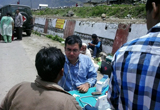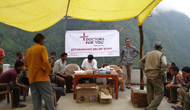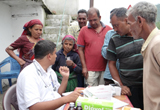 The recent flash floods in the mountain state of Uttarakhand struck some of the most holy temples in the Himalayas. Pilgrims from all parts of the country were trapped in remote villages of the Himalayan districts. Early in the monsoon season, from the 14 June, there were incidents of flash floods and landslides in the Uttarkashi, Chamoli, Tehri, and Rudraprayag districts.
The recent flash floods in the mountain state of Uttarakhand struck some of the most holy temples in the Himalayas. Pilgrims from all parts of the country were trapped in remote villages of the Himalayan districts. Early in the monsoon season, from the 14 June, there were incidents of flash floods and landslides in the Uttarkashi, Chamoli, Tehri, and Rudraprayag districts.
“Doctors-For-You” (DFY), an Indian medical humanitarian organisation arrived at Badrinath to help with the medical rescue and with assessing the medical and nutritional needs in the inaccessible affected areas. Evacuating people by road was impossible and the rush to send air relief an imperative. Despite the rescue efforts by the army and the National Disaster Response Force, it took more than a fortnight to rescue the thousands of pilgrims who were stranded. In the first three days, DFY set up camps for people who were stranded, and the Army bought back the most critically ill people to these camps. DFY sent two more teams to the areas of Rudraprayag, Guptkashi, Phata, and Sonprayag. One DFY team remained in Phata and worked alongside the government rescue efforts, catering to the medical needs of the surrounding villages. Most villages are still cut off from the outside world. The other team worked with a partner organisation in the remote villages surrounding Rudraprayag.
 This disaster, unlike all other disasters that have occurred in India, has impacted on people from almost all the states in India, as well as people from surrounding countries such as Nepal. A unique event in its own, the Uttarakhand floods have reminded us of the wrath of nature.
This disaster, unlike all other disasters that have occurred in India, has impacted on people from almost all the states in India, as well as people from surrounding countries such as Nepal. A unique event in its own, the Uttarakhand floods have reminded us of the wrath of nature.
Since the majority of the people who were affected were pilgrims and the residents of sparsely populated Himalayan hamlets, most of the patients were the elderly. There was a large need for hypertensive drugs and drugs to control diabetes. Following the evacuation of the visitor pilgrims, the focus on the locals has now intensified. Most of the villages that are not accessible by road, are being serviced by doctors on foot, and these trekking routes are treacherous. The majority of the illnesses of the local inhabitants are not related directly to the disaster, but related to inadequate access to healthcare facilities. The disaster has only made it worse.
 Furthermore, despite strong condemnation from public health and mental health professionals, mass cremation of dead bodies took place. Media frenzy, public fear, and deep rooted myths about infections spreading due to dead bodies made it extremely difficult for us to advocate proper disposal of the dead, in accordance with the national and WHO/PAHO guidelines. The poor management of dead bodies and inadequate closure, often has longer term mental health consequences after major disasters and impacts on the legal compensation process. Humanitarian workers need to look after the dead, as well as they do for the living survivors.
Furthermore, despite strong condemnation from public health and mental health professionals, mass cremation of dead bodies took place. Media frenzy, public fear, and deep rooted myths about infections spreading due to dead bodies made it extremely difficult for us to advocate proper disposal of the dead, in accordance with the national and WHO/PAHO guidelines. The poor management of dead bodies and inadequate closure, often has longer term mental health consequences after major disasters and impacts on the legal compensation process. Humanitarian workers need to look after the dead, as well as they do for the living survivors.
We declare that that we have read and understood the BMJ Group policy on declaration of interests and we have no relevant interests to declare.
Ravikant Singh and Mridul Deka are relief workers for Doctors For You, India.
